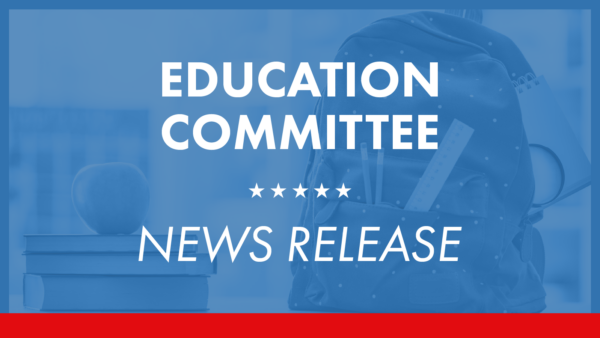
HARRISBURG – The Senate Education Committee approved an innovative package of bills today designed to help more young people in Pennsylvania pursue post-secondary education and career training.
The “Grow PA” post-secondary education reform plan includes seven bills designed to help make Pennsylvania more competitive in attracting and retaining students to attend college and complete certificate and job-training programs.
Grow PA includes the creation of two new programs to encourage students in Pennsylvania and from out-of-state to enroll in higher education programs on the condition that they remain and work in Pennsylvania after completing their studies.
Senate Bill 1150, sponsored by Senate Appropriations Committee Chair Senator Scott Martin (R-Lancaster), would create the Grow PA Scholarship Grant Program, which would offer grants of up to $5,000 per year for in-state students who attend college in Pennsylvania, pursue a degree in a high-demand industry, and agree to live and work in that industry in Pennsylvania after graduation.
Grant recipients would be required to live and work in Pennsylvania for at least 15 months for each year they accept the grant. Failure to meet this requirement would result in the grants being converted to a loan that must be repaid.
Senate Bill 1151, sponsored by Martin, would create the Grow PA Merit Scholarship Program, which would help attract high-performing out-of-state students to Pennsylvania educational programs in Pennsylvania State System of Higher Education (PASSHE) schools. The merit scholarships would allow students pursuing in-demand occupations to pay tuition at in-state rates, rather than out-of-state rates.
Like the scholarship program for in-state students, merit scholarship recipients would be required to live and work in Pennsylvania after graduation, or have the scholarships converted to loans.
“Make no mistake, we face a severe crisis of young people leaving Pennsylvania to pursue jobs and education in other states. The impacts of this exodus from Pennsylvania are catastrophic,” Martin said. “These bills offer the promise of a brighter future for Pennsylvania by focusing our investments on the industries that will help Pennsylvania grow economically and demographically in the years ahead.”
Senate Bill 1152, sponsored by Senator Devlin Robinson (R-Allegheny), would expand the popular Ready to Succeed Scholarship Program, which provides scholarships to good students to cover the cost of post-secondary education. The bill would increase household income limits from $126,000 to $175,000 and allow students with at least a 2.5 GPA to qualify, making more students eligible for assistance.
“I am thrilled to prime sponsor legislation to expand the popular Ready to Succeed Scholarship Program, which helps students be able to better afford higher education opportunities,” Robinson said. “I hear from my constituents constantly about the struggle of student loans and juggling debt just because they want to further their education. Senate Bill 1152 will be a breath of fresh air for these individuals, their families, and our entire communities.”
Senate Bill 1153, sponsored by Senator Tracy Pennycuick (R-Montgomery), would expand the Fostering Independence Tuition Waiver Program nationwide for children to attend PASSHE schools. Under current law, children in the foster care system and children who were adopted in Pennsylvania qualify for financial aid and tuition waivers.
The legislation will waive tuition and mandatory fees after the application of federal and state grants available to the student. Expanding the program nationwide would allow adopted and foster children from other states to benefit from these programs in Pennsylvania.
“Giving every kid in foster care and those who were adopted a chance to come to Pennsylvania and take advantage of our outstanding PASSHE schools not only benefits these kids, but helps our Commonwealth by attracting talented young students to our colleges and universities and supports our economy,” Pennycuick said.
Senate Bill 1154, sponsored by Senate Majority Whip Ryan P. Aument (R-Lancaster), would add performance-based metrics to funding for state-related universities, including the University of Pittsburgh, the Pennsylvania State University, and Temple University. Under the legislation, standards would be developed by a new Performance-based Funding Council that will consider factors like graduation rates, retention rates, employment rates and salaries, and other key indicators.
The bill would add a critical layer of accountability to public dollars dedicated to these institutions.
“While investing in education is certainly a priority, we cannot blindly throw taxpayer dollars into a system without setting performance standards to ensure that system is working for Pennsylvania,” said Aument. “Rewarding universities that produce students who are ready to enter into an in-demand career field in Pennsylvania immediately following graduation will improve overall outcomes from our higher education system, use taxpayer dollars more responsibly, and boost our skilled workforce and taxbase by attracting talented graduates to stay in Pennsylvania after college. Moving to a performance-based funding model will create a direct pipeline from Pennsylvania institutions of higher education to Pennsylvania jobs, benefitting us all.”
Senate Bill 1155, sponsored by Senate Education Committee Chair David G. Argall (R-Schuylkill), would develop a special task force to review additional improvements to higher education and career preparation programs going forward, including increasing community college transfers, expanding dual enrollment, encouraging employer incentives, increasing student enrollment from other states, and boosting efficiencies in higher education.
“The serious problems facing higher education in Pennsylvania will not be solved overnight,” Argall said. “The Higher Education Task Force proposed in my legislation will ensure that today’s votes are just the start of a prolonged, dedicated public effort to encourage our high school and college students to build their careers here in Pennsylvania.”
The bills now move to the full Senate for consideration.
Also included in the package is Senate Bill 750, sponsored by Martin, which would require high school seniors to complete the Free Application for Federal Student Aid (FAFSA), which determines eligibility for federal, state and school financial aid programs. Completing the FAFSA ensures families have access to vital information on aid packages for higher education, career and technical education, certificate programs, and more.
Pennsylvania has one of the lowest FAFSA completion rates in the nation, leaving many families without the ability to make informed decisions about pursuing college and job training programs. The National College Attainment Network estimates that $3.75 billion in federal Pell Grants went unclaimed nationwide in 2021 alone, including more than $115 million in Pennsylvania.
Senate Bill 750 was approved by the Senate last June and was sent to the House of Representatives for consideration.
The Senate Education Committee held a public hearing on the Grow PA plan on Monday to gather testimony from key stakeholders in higher education and employers, including the Pennsylvania Higher Education Assistance Agency (PHEAA), the Pennsylvania State Nurses Association (PSNA) and the Pennsylvania Chamber of Business and Industry.
Aaron Riggleman, PA Chamber Manager of Government Affairs, spoke about workforce challenges and the importance of reversing the state’s negative trends.
“We only have 66 workers for every 100 jobs. Our population growth has slowed, and we are a net exporter of our very own people,” Riggleman said. “Due to the recognition from lawmakers and the plan we’re discussing today, there is an opportunity to rethink higher education in the Commonwealth.”
PSNA CEO Wayne Reich spoke about the importance of Grow PA to strengthen the state’s workforce in the health care industry and make degrees more affordable.
“A four-year bachelor’s degree program at a public school can cost anywhere between $40,000 and $80,000. The cost at a private school is between $60,000 and $120,000. Believe me, nurses would welcome legislation that would help to reduce that cost, and it would also be an incentive to keep nurses in the Pennsylvania work force,” Reich said.
PHEAA Senior Vice President of Public Affairs, Guaranty and Strategy Nathan Hench spoke about the potential to expand existing programs that are already working on behalf of students and families.
“While the Ready to Succeed Program has made significant impact for Pennsylvania students and families, there are avenues for expanding its reach, such as broadening the income limit to encompass more middle-income families, raising the maximum award, and refining the GPA requirements,” Hench said. “As with the Ready to Succeed Scholarship Program, there are a number of ways in which PA-TIP can be broadened, including expanding the number of eligible programs of study that lead to in-demand occupations, and providing additional resources to fully fund the program.”
The committee also heard testimony from Catherine Repkoe, a Lancaster County high school student who is interested in pursuing a teaching degree at Millersville University after she graduates.
“It’s no secret the rising cost of college has become so incredibly overwhelming for so many young people,” Repkoe said. “Having additional financial assistance will have an incredible impact on my ability to go to school, especially during student teaching when I won’t be able to work.”
CONTACT: Jason Thompson (Martin)
Stephanie Applegate (Aument)
Jim Brugger (Argall)
Kevin Battle (Robinson)
Matt Szuchyt (Pennycuick)


